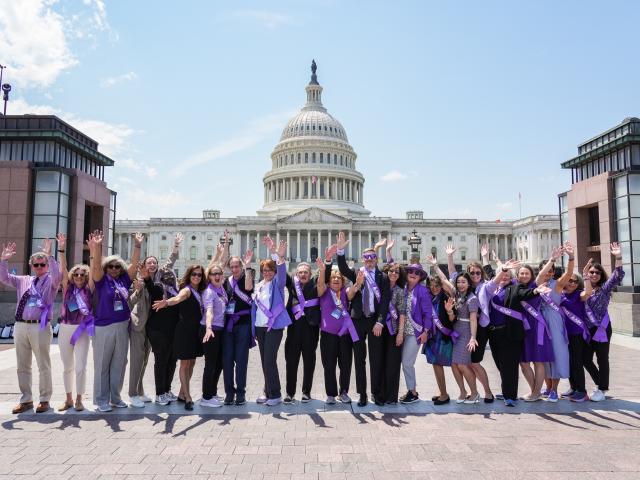NAPA Reauthorization Act and Alzheimer’s Accountability and Investment Act will build on the progress made in the fight against Alzheimer’s
Washington, D.C., October 2, 2024 — Two pieces of critical bipartisan legislation that renew the nation’s commitment to the fight against Alzheimer’s and other dementia were signed into law: the NAPA Reauthorization Act and the Alzheimer’s Accountability and Investment Act. These bipartisan bills will continue the critical work of the National Plan to Address Alzheimer’s Disease to support Alzheimer’s research and improve the delivery of clinical care and services for people impacted by Alzheimer’s.
“Today is a significant day for those impacted by Alzheimer’s and other dementia throughout the nation. With the NAPA Reauthorization Act and the Alzheimer’s Accountability and Investment Act signed into law, our nation has taken a major step forward in the fight against this devastating disease,” said Robert Egge, Alzheimer’s Association chief public policy officer and AIM president. “On behalf of the Alzheimer’s Association, thank you to our outstanding congressional champions on both sides of the aisle for your steadfast leadership and tireless efforts to advance these bills across the finish line.”
The NAPA Reauthorization Act reauthorizes the National Alzheimer’s Project Act (NAPA) (P.L. 111-375) by extending the strategic National Plan and emphasizing the importance of healthy aging and risk reduction. Prior to NAPA, there was no comprehensive plan to address Alzheimer’s. In 2010, for every dollar the federal government spent on the cost of Alzheimer’s care, it invested less than a penny on research for the disease. NAPA has fundamentally changed the way the nation addresses Alzheimer’s and all other dementia.
The Alzheimer’s Accountability and Investment Act builds on the original Alzheimer’s Accountability Act (AAA), which was first enacted in 2014. This bipartisan legislation ensures Congress will continue to hear directly from scientists at the National Institutes of Health (NIH) on the Alzheimer’s and dementia research funding needed to achieve the goals in the National Plan.
“Today we can reflect on how far we’ve come since the passage of NAPA and AAA. We now have multiple Food and Drug Administration (FDA)-approved Alzheimer’s treatments, better understanding of risk factors and prevention, improved dementia care and support, and we are closer than ever to biomarker tests, which will improve access to earlier and more accessible diagnosis,” said Egge. “With these two reauthorizations, the progress of the next decade will bring additional breakthroughs that improve the lives of people living with Alzheimer’s and other dementia and their families.”
The NAPA Reauthorization Act and the Alzheimer’s Accountability and Investment Act were introduced by Sens. Susan Collins (R-Maine), Ed Markey (D-Mass.), Shelley Moore Capito (R-W.Va.), and Mark Warner (D-Va.) in the Senate, and Reps. Chris Smith (R-N.J.), Paul Tonko (D-N.Y.) and Maxine Waters (D-Calif.) in the House.
“Over the last decade, Congress has taken action to make historic investments in Alzheimer’s research, expanded the dementia public health infrastructure and improved access to quality care and support,” said Egge. “Thanks to our incredible advocates and bipartisan congressional champions, our nation is enacting laws like the NAPA Reauthorization Act and the Alzheimer’s Accountability and Investment Act, changing the trajectory of this devastating disease until we one day achieve our vision of a world without Alzheimer’s and all other dementia.”
